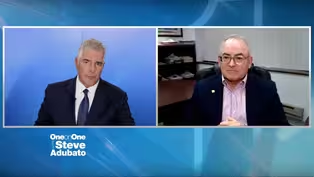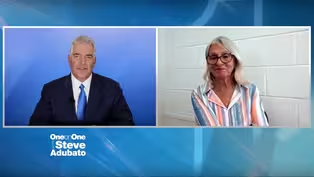One-on-One
The importance of preserving Holocaust survivors' stories
Clip: Season 2025 Episode 2775 | 9m 58sVideo has Closed Captions
The importance of preserving Holocaust survivors' stories
Adara Goldberg, Ph.D., Executive Director of the Holocaust Resource Center and Human Rights Institute at Kean University, joins One-on-One Senior Correspondent Jacqui Tricarico for an important discussion about preserving Holocaust survivors' stories and sharing resources to combat prejudice and antisemitism.
Problems playing video? | Closed Captioning Feedback
Problems playing video? | Closed Captioning Feedback
One-on-One is a local public television program presented by NJ PBS
One-on-One
The importance of preserving Holocaust survivors' stories
Clip: Season 2025 Episode 2775 | 9m 58sVideo has Closed Captions
Adara Goldberg, Ph.D., Executive Director of the Holocaust Resource Center and Human Rights Institute at Kean University, joins One-on-One Senior Correspondent Jacqui Tricarico for an important discussion about preserving Holocaust survivors' stories and sharing resources to combat prejudice and antisemitism.
Problems playing video? | Closed Captioning Feedback
How to Watch One-on-One
One-on-One is available to stream on pbs.org and the free PBS App, available on iPhone, Apple TV, Android TV, Android smartphones, Amazon Fire TV, Amazon Fire Tablet, Roku, Samsung Smart TV, and Vizio.
Providing Support for PBS.org
Learn Moreabout PBS online sponsorship(upbeat music) - Hi, I'm Jacqui Tricarico, Senior Correspondent for "One-on-One," and I'm so pleased to be joined now by Dr. Adara Goldberg, the Director of the Holocaust Resource Center at Kean University.
Thank you so much for joining us, Dr. Goldberg.
- Absolutely, it's my pleasure to be here, thank you.
- So the Holocaust Resource Center was created over 40 years ago by Holocaust survivors living right here in New Jersey.
Describe that time and why and how they created this resource center at Kean University.
- So the center was founded in 1982, so we are now in our 42nd year, by a group of survivors who settled in and around Elizabeth.
And their goal was to create an accessible, free space for Holocaust education for all New Jerseyites, regardless of background, education, economic status.
They truly believed that the only way that they could honor the memory of their lost communities and families was to remember the past, honor the present, and shape the future.
And we do that through education, commemorations, and collections every single day.
- Why Kean University, and in what ways are the staff and students using it, but also, does the outside population have access to it?
- Well, I think the first answer is everybody has access to it.
We are a community site.
We work both on and off the university campus.
Kean was chosen because this was the neighborhood that the survivors chose to establish their new lives in, and they developed a close working relationship with the administration who agreed that Kean as a public institution was the appropriate place for New Jerseyites, again, across all ethno-religious economic groups, to have access to education and remembrance long after the survivors were gone.
And so today, we reach folks in our physical space, located in the Nancy Thompson Learning Commons, as well as in school districts across the state.
Approximately 140 of them work directly with us for graduate classes, undergraduate classes, commemorations, and programming.
- Talk about some of those resources and the tools that are there in the center.
What can people find there?
- So, if people come to visit our center, they will find that we have one of the largest print collections of Holocaust material in the state of New Jersey.
Despite being a school with a smaller population than Rutgers, for instance, we are very proud of our robust collection.
So they would find approximately 8,000 print texts; an original AV oral history collection featuring testimonies from Holocaust survivors, witnesses, and liberators; as well as a really exciting collection we acquired three years ago this month from Josiah DuBois, who was a New Jersey lawyer who was a member of the State Department during World War II, and he was one of the whistle-blowers on America's inaction to respond to the plight of Jewish refugees that ended up helping to create the War Refugee Board.
And so these are just some of the items that folks visiting our site can access right at their fingertips.
- The oral histories, I wanted to talk a little bit more about that because when we're talking about Holocaust survivors and that population that are here, those folks are getting older, and so many of them have died or are a lot older.
So, those oral histories are more important than ever.
How are you making sure that you're still getting those, preserving those, and how important is it to have those accessible and use those tools for teachers and students to learn more about this time in our history?
- So, as resources, as you know, eyewitness accounts, they are invaluable.
Every single one of the testimonies in our collection is fully digitized and available both at the site, as well as through the United States Holocaust Memorial Museum website.
So this is ensured that people all around the world, and not only in New Jersey or in Union County, can view any of those testimonies at any time of day, night.
They can share it with their families, with their classrooms, with their colleagues.
And so I think there's this piece that as the survivor generation continues to decline, their stories not only provide a lens into thinking about the past, understanding what life was like before the Holocaust, what did people experience during those years of terror, and also how did people rebuild their lives, and particularly, in our case, their lives in New Jersey.
This was a choice they made, and they chose New Jersey because they saw this as a space where they could safely raise a family and begin again.
And so the last oral history testimony we actually collected was two years ago.
A gentleman who had never given testimony before participated in one of our COVID-era Zoom events that was speaking about wartime refugees.
And it was a light-bulb moment, where he realized that his story mattered.
And despite COVID, all of the safety precautions, our team at Kean, with the help of University Relations, managed to create a really exemplary experience for Mr. Goldsmith to record his testimony.
Since then, he unfortunately has passed away, but we have a repository of his archival materials, his testimony and lesson plans that we have created to honor his memory - That oral history lives on, which is so incredible and so important.
I wanted to talk a little bit too about the rise of antisemitism.
We've seen it in New Jersey, across the country, across the nation, especially in the past year.
How are you, at the Holocaust Resource Center, addressing antisemitism and using the resources that you have to really combat prejudice and promote understanding?
- So I would say there's two key ways.
The first is that we have always been proactive.
So we have never waited for a moment where there is a rise in antisemitism, because ultimately there has been a rise in antisemitism.
It's never quite gone down, it's just now that it's more visible.
So we offer a professional development session that we bring into schools across the state that addresses antisemitism, bias crimes, as well as the role of social media in influencing young people and their beliefs to make responsible decisions and use critical thinking.
But the main tool comes through our Graduate Program.
We offer the state's only tuition-waived Post-Baccalaureate Certificate in teaching the Holocaust and Prejudice Reduction.
More than 6,000 New Jersey teachers have been trained by this two-year program, and these teachers come in and they have four semesters to really delve into the history of the Holocaust, consider historic antisemitism, its manifestations today, and connect it to real-world problems and other forms of prejudice because they are the ones who are responsible for helping to educate the next generations.
- I know one of those teachers, Joseph Nappi, last year's New Jersey State Teacher of the Year, went through that programming and was really recognized for what he's doing in his classroom in regards to that.
Lastly, Dr. Goldberg, this is such important work.
What has it done for you personally?
- This is my life's work.
Some people speak about what they do as a job.
For me, it is so far beyond a vocation.
It is what I feel like I was brought into this world to remember those survivors, to shed light on their stories, the voices of those who could not speak for themselves.
I like to think that I am an adequate stand-in for a person.
I truly believe in the work that we do, and I truly believe that the commitment of Kean University and the Holocaust Resource Foundation, which supports our work, is changing the future for all of the hate that we see every single day.
When we turn on our TVs, we open up our phones, I can tell you that Holocaust Resource Center is a bastion of peace and inclusivity, and we are trying to be that brave space and safe space that people need right now more than ever.
- Definitely, thank you so much for the work that you and your colleagues are doing there, and thank you for joining us to give us more information about the important resources available at the Holocaust Resource Center at Kean University.
We appreciate it.
- Thank you so much for having me.
- We thank you so much for watching, we’ll see you next time.
- [Narrator] One-On-One with Steve Adubato is a production of the Caucus Educational Corporation.
Celebrating 30 years in public broadcasting.
Funding has been provided by The Russell Berrie Foundation.
NJM Insurance Group.
PSEG Foundation.
Newark Board of Education.
Johnson & Johnson.
PSE&G, Wells Fargo.
Community FoodBank of New Jersey.
And by Horizon Blue Cross Blue Shield of New Jersey.
Promotional support provided by CIANJ, and Commerce Magazine.
And by ROI-NJ.
CEO of Mercer Street Friends examines rising food insecurity
Video has Closed Captions
Clip: S2025 Ep2775 | 10m 27s | CEO of Mercer Street Friends examines rising food insecurity (10m 27s)
Making a difference in the lives of foster-care families
Video has Closed Captions
Clip: S2025 Ep2775 | 7m 56s | Making a difference in the lives of foster-care families (7m 56s)
Providing Support for PBS.org
Learn Moreabout PBS online sponsorship
- News and Public Affairs

Top journalists deliver compelling original analysis of the hour's headlines.

- News and Public Affairs

FRONTLINE is investigative journalism that questions, explains and changes our world.












Support for PBS provided by:
One-on-One is a local public television program presented by NJ PBS

